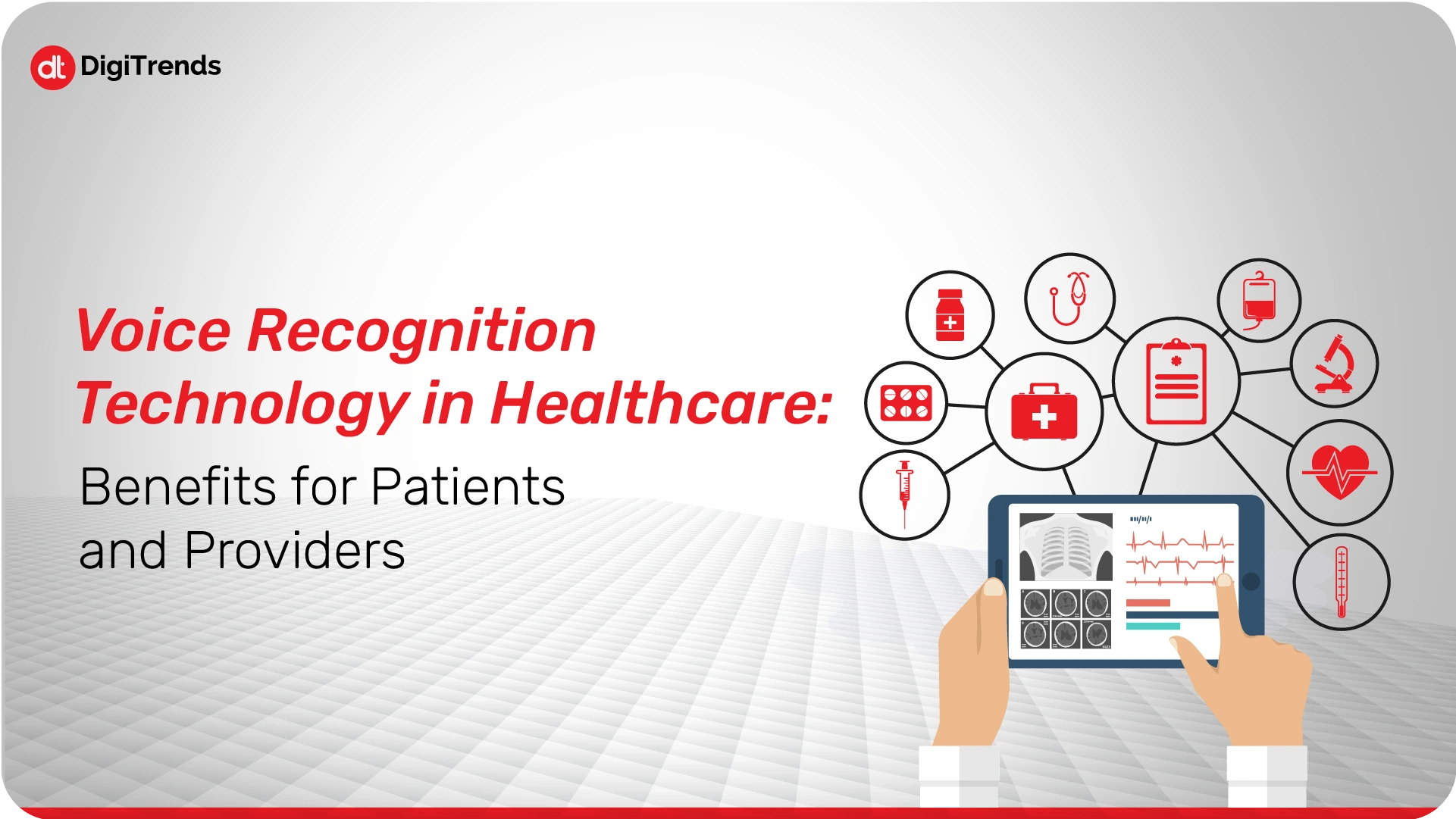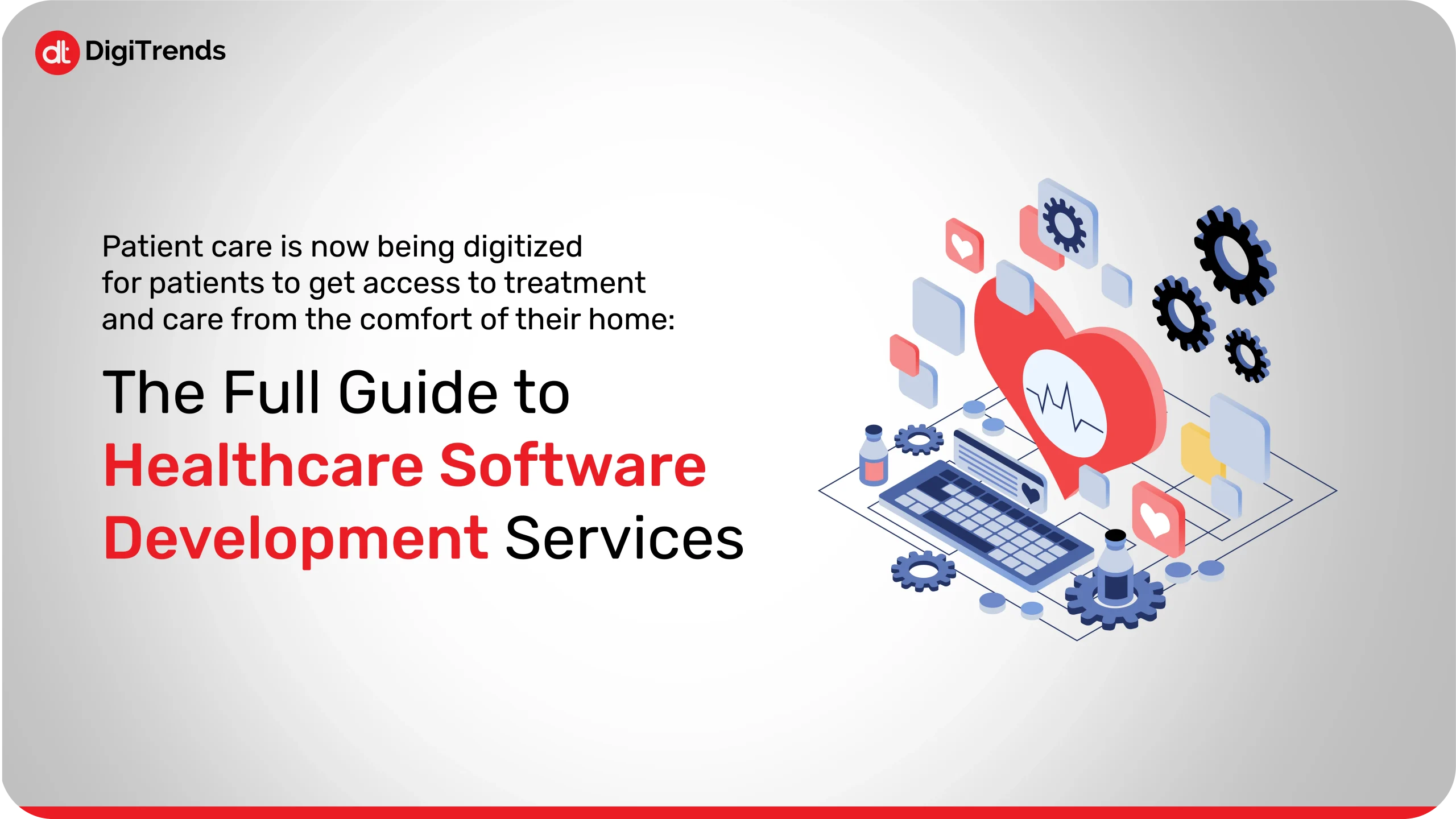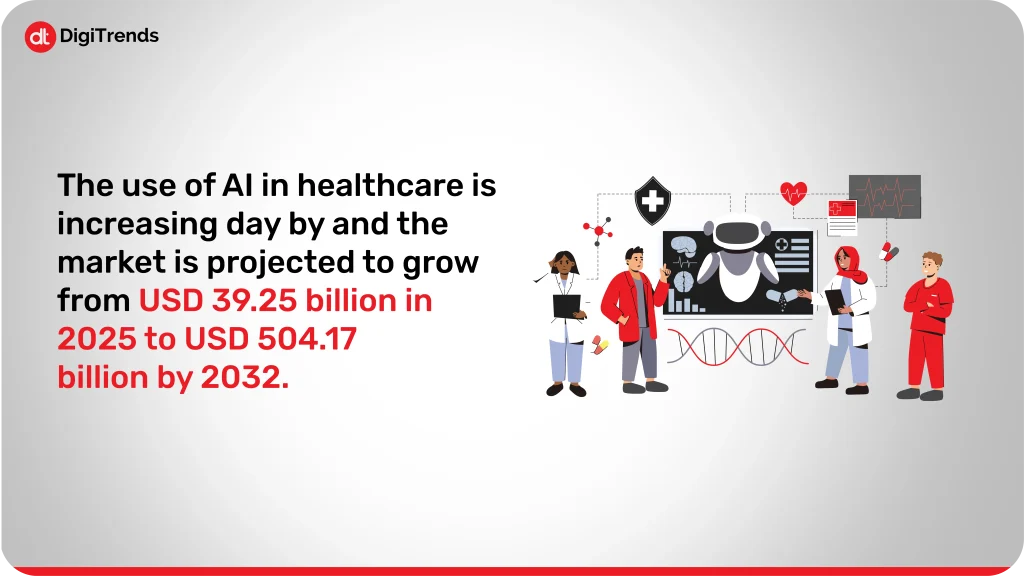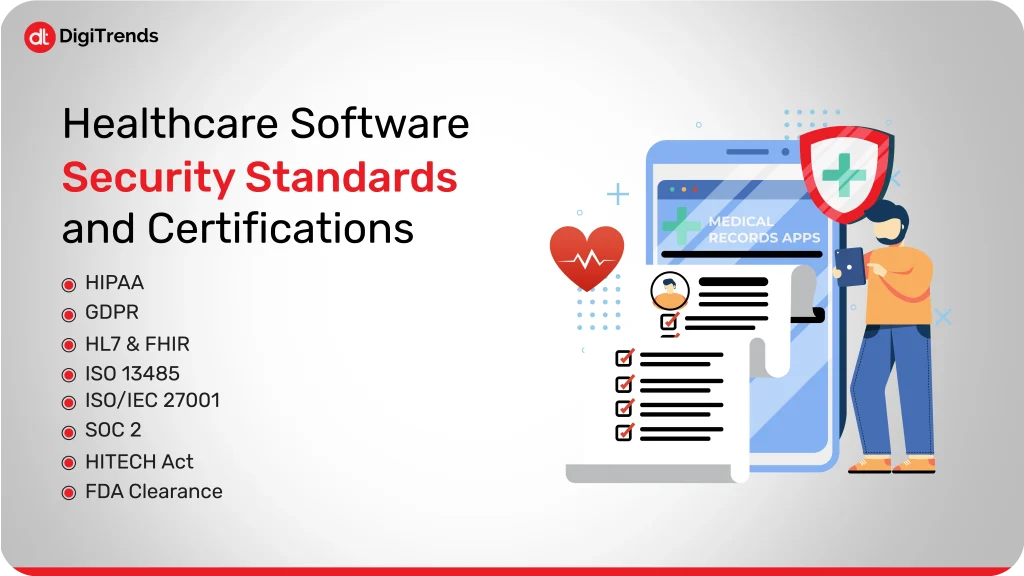
Voice Recognition Technology in Healthcare: Benefits for Patients and Providers
Explore how voice recognition technology is being used across healthcare and the role of voice assistants in clinical environments.
Continue Reading
Similar to how we are always moving forward, technology is also advancing with us; we can even say it’s advancing faster than we are. Every sector, every industry, is now providing solutions that make services fast and accessible for its users and customers. The same is the case with the healthcare industry, patient care is now being digitized for patients to get access to treatment and care from the comfort of their home, for example, if a patient is not feeling well and wishes to see a doctor but can’t drive for some reasons, this is when telemedicine apps come in handy.
Telemedicine apps offer healthcare online, and patients can get fast diagnoses, chat with doctors, and get prescriptions, all while sitting at home. This is the impact of healthcare software development. If you are a healthcare business looking to scale up your healthcare business or a startup looking to enter the telemedicine industry, this is the right time, and you are at the right place.
You might be thinking, what goes into building these digital tools? And would you ensure that the software is secure, reliable, and improves patient outcomes?
Don’t worry! That’s exactly what we’re going to explore in this guide.
This blog will walk you through everything you need to know about healthcare software development services, from must-have features and compliance standards to trends and tech stacks.
Let’s deeply explore the healthcare software development services:
The healthcare industry is now driven by new technologies like artificial intelligence, cloud computing, etc. Healthcare is going through a major change right now, as patients are now exploring digital solutions. The rising demand for digital healthcare is making healthcare providers, startups, and companies invest in medical software development and adopt modern solutions for patient care like remote patient monitoring, electronic health records (EHRs), and AI-powered diagnostic tools. According to Global Market Insights, the digital health market size is expected to exceed USD 981.5 billion by 2032.
These numbers project the growth and the fundamental shift in how healthcare is delivered and experienced. People are now looking for personalized options and accessibility, which is exactly what healthcare software delivers in patient care. As the industry becomes increasingly data-centric, the role of software has shifted from supportive to essential. This shift is also pushing organizations to prioritize long-term scalability, seamless integration, and regulatory readiness in their digital strategies. Overall, the market looks great to step in and build healthcare software for your hospital, startup, or healthcare organization.

Before we dive straight into the healthcare software development services and technologies, you should know what benefits they provide to patients and healthcare providers.
Let’s have a look at the benefits of healthcare software development:
Healthcare software now comes with features like AI-powered diagnostics, telemedicine, and remote patient monitoring, which allows patients to receive faster and more effective care, as this software provides accurate diagnoses, real-time monitoring, and personalized treatment plans for patients. Imagine receiving accurate diagnoses for your illness and getting prescribed medicines and treatment faster than physically visiting a doctor for non-critical issues like the flu. It’s great, right? This is one of the benefits of digital healthcare.
We all have seen how busy the hospital systems are. Sometimes the staff makes mistakes, writes the wrong names, or files are lost. A healthcare software will solve all these issues by streamlining administrative workflows and automating appointment scheduling, billing, patient data management, and reporting. This will reduce paperwork, manual errors, and save time for both healthcare staff and patients.
With technologies like AI/ML or AR/VR being added in healthcare software, doctors can study the patient’s body in a better way, which will lead to a fast and efficient diagnosis for critical cases, especially. Advanced analytics and integrated dashboards will give healthcare providers a 360-degree view of patient history, treatment effectiveness, and resource utilization. These insights will help them make evidence-based decisions, and the results will be improved too.
From mobile apps to patient portals, healthcare software allows patients to track their health, communicate with doctors, and access records at their convenience, which builds trust, and patients will more frequently get checkups and treatment because of its accessibility.
For a business or healthcare provider looking to scale up the healthcare business or even a startup looking to build something meaningful, medical software development is the right option as it is a highly scalable business due to its increasing demand and the software can also be integrated in hospital systems, IoT device, or third-party services.
A custom healthcare software is the best option as it will reduce inefficiencies, minimize maintenance issues, and deliver a better return on investment. The cost of building it might be high, but it is completely worth it.
Custom healthcare software is a strategic asset that empowers providers to deliver smarter care, stay competitive, and adapt to an increasingly digital-first healthcare landscape.
The evolution of healthcare software is fueled by a powerful tech stack designed to handle everything from patient data and diagnostics to real-time communication and compliance. Here are the core technologies driving innovation in this space:

Artificial intelligence algorithms enable predictive analytics, medical image recognition, patient risk scoring, and even clinical decision support. ML models can be trained to detect anomalies in X-rays, predict disease progression, and personalize treatment recommendations. The use of AI in healthcare is increasing day by and the market is projected to grow from USD 39.25 billion in 2025 to USD 504.17 billion by 2032.
IoMT is connected to devices like smart wearables, ECG monitors, and remote sensors that collect real-time patient data, which is then synced with apps or dashboards. These insights are critical for proactive care, chronic disease management, and remote monitoring.
Cloud-based platforms ensure secure storage, easy access, and scalable infrastructure for large volumes of healthcare data. They also support seamless integration with EHR systems, mobile apps, and telemedicine platforms, while offering cost-efficient deployment.
Blockchain adds transparency and security to health data management. It ensures immutable medical records, secure transactions, and improved traceability for items such as drug supply chains, patient consent, and health insurance claims.
Healthcare generates vast amounts of structured and unstructured data. Big Data platforms process this information to uncover patterns, improve diagnostics, reduce readmissions, and optimize hospital resource utilization.
Telemedicine app development includes secure video conferencing APIs, encrypted communication protocols, and virtual care platforms that are crucial to remote consultations, follow-ups, and mental health services, particularly in the post-COVID-19 era.
Mobile health apps enable patients to track fitness, medication schedules, or vital signs. Integration with wearables like Apple Watch or Fitbit enriches health data and encourages continuous engagement.
RPA (Robotic Process Automation) tools help healthcare providers automate repetitive administrative tasks such as billing, appointment reminders, insurance verification, and patient onboarding, freeing up valuable human resources.
To ensure interoperability and regulatory compliance in healthcare software, developers implement standards like FHIR (Fast Healthcare Interoperability Resources) and HL7, which facilitate secure data exchange across healthcare systems.
Modern healthcare software isn’t built with just one technology; it’s the result of a carefully orchestrated tech stack that blends data, connectivity, and intelligence. Choosing the right technologies can make the difference between a basic app and a high-impact healthcare solution.
Contact us to build secure, scalable solutions tailored to modern healthcare needs.
Get StartedHealthcare software development covers a wide range of services tailored to meet the needs of hospitals, clinics, startups, insurers, and other healthcare providers. These are the most in-demand and impactful services offered by development companies today:
Tailored solutions built from the ground up to meet specific business and clinical requirements. These can include EHR systems, diagnostic tools, hospital management platforms, or specialized patient apps, designed to be fully scalable, secure, and user-friendly.
Development of robust, interoperable platforms like electronic health records (EHR) or electronic medical records systems (EMR) for managing patient medical history, treatment plans, and diagnostics. Includes integration with third-party systems, compliance with HIPAA/HL7/FHIR, and role-based access control.
Creation of secure, user-friendly platforms that enable virtual consultations, remote diagnosis, follow-up care, and even mental health services. Often includes features like real-time video/audio, e-prescriptions, appointment scheduling, and in-app payments.
Mobile health apps that empower patients to monitor vitals, manage medications, access health records, and interact with healthcare providers on the go. Includes integration with wearable devices and adherence to medical app regulations.
Development of CRMs focused on patient relationship management, tracking patient journeys, personalizing communication, automating reminders, and optimizing marketing or engagement campaigns.
Custom software that automates and optimizes billing, claims processing, and insurance verification. Designed to reduce errors, prevent claim rejections, and improve financial performance for healthcare providers.
Software that collects and analyzes real-time patient health data (e.g., heart rate, glucose levels) from IoMT devices and sends alerts to care teams if intervention is needed. Vital for chronic condition management and post-operative care.
Advanced dashboards and data platforms that enable predictive analytics, operational reporting, population health management, and clinical decision support.
Connecting new solutions with legacy systems like HIS (Hospital Information Systems), PACS, LIS, pharmacy databases, or insurance platforms, ensuring seamless data flow and unified workflows across departments.
From mobile apps that engage patients to backend systems that streamline hospital operations, these services form the foundation of digital healthcare transformation. Choosing the right mix of services depends on your specific goals, whether it’s improving care delivery, boosting patient engagement, or increasing operational efficiency.
Companies like DigiTrends are actively supporting healthcare providers and startups by delivering innovative, regulation-ready software solutions designed for the evolving digital health landscape.

Security is non-negotiable in healthcare software development. With sensitive patient data at stake and strict regulations in place, ensuring privacy, integrity, and compliance is critical. Here are the key standards and certifications every healthcare solution must adhere to:
HIPAA is the gold standard for protecting patient health information (PHI) in the United States. Healthcare software must ensure:
Applicable to software handling data of EU citizens, GDPR emphasizes:
These are global standards for the secure exchange of healthcare data across systems:
ISO 13485 is an international standard for quality management systems in the design and development of medical devices and related software. It’s crucial for software classified as Software as a Medical Device (SaMD).
ISO/IEC 27001 is are global standard for information security management systems (ISMS), ensuring proper risk assessment, data handling, and mitigation processes are in place across the software lifecycle.
Primarily for SaaS-based healthcare platforms, SOC 2 ensures a company meets trust principles related to security, availability, processing integrity, confidentiality, and privacy of customer data.
An extension of HIPAA in the U.S., the HITECH Act promotes the adoption of EHRs and sets stricter penalties for non-compliance, especially related to data breaches and unauthorized disclosures.
Software that performs clinical functions, such as diagnostics, monitoring, or treatment recommendations, may require FDA clearance as a Software as a Medical Device (SaMD). It involves rigorous testing, risk assessment, and documentation.
Non-compliance can result in heavy fines, legal action, data breaches, and reputational damage. Beyond regulation, adhering to these standards ensures that patient data remains secure, systems remain interoperable, and trust is maintained throughout the care continuum.
Organizations like DigiTrends and others leading in healthcare software development prioritize compliance from day one, embedding security best practices into every stage of product design, development, and deployment.
As healthcare continues its digital transformation, software is no longer just a support tool; it’s becoming the backbone of modern healthcare delivery. From smarter diagnostics and remote consultations to secure patient records and real-time monitoring, the possibilities are vast and growing.
Whether you’re a healthcare provider aiming to streamline operations, a startup breaking into the healthtech space, or simply someone intrigued by how tech is reshaping healthcare, the key takeaway is this: custom healthcare software isn’t just a luxury anymore; it’s a necessity.
But success in this space goes beyond just building an app. It’s about choosing the right technologies, staying compliant with ever-evolving regulations, focusing on user-centric design, and partnering with experienced development teams that understand the complexity of healthcare.
